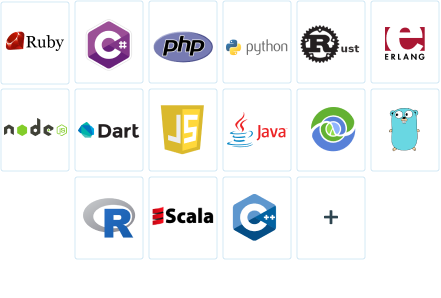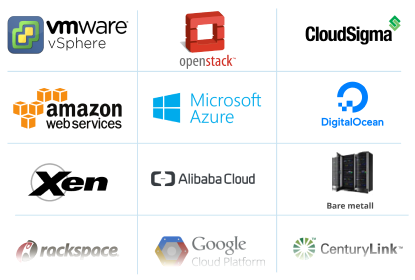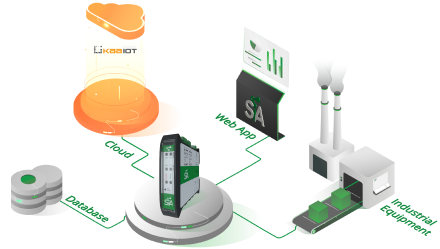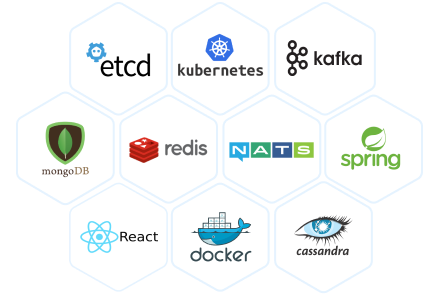Why choose Kaa IoT platform?
With a strong focus on connectivity, device management, and security, the KaaIoT platform empowers your business to thrive in an increasingly digital world. Say goodbye to connectivity issues and hello to uninterrupted data flow.Ready-to-go fully-featured PaaS solution. GET FREE TRIAL
End-to-end IoT development experience with Kaa
Kaa provides a number of competitive advantages for rapid IoT development and deployment. It empowers IoT solution engineers with end-to-end IoT development experience so that they can create fully-featured enterprise-grade IoT applications on a single platform.
Customizable microservice architecture
Every feature of the Kaa IoT platform, such as messaging or visualization, is essentially a collection of microservices that perform their specific functions.
Microservices simplify customization and ensure effective separation of concerns between different parts of the platform.

Freedom of technology
Following the industry best practices, Kaa runs its microservices in Docker containers. This means you can use your favorite DevOps tools when implementing Kaa-based solutions in any environment.
Moreover, Kaa uses well-defined interfaces based on REST and NATS, which makes it technology agnostic and allows you to develop and deploy applications written in virtually any programming language.

Freedom of deployment
You are free to deploy Kaa services anywhere you prefer. You can do that at your own data center premises—either bare metal or virtual machines—or you can host Kaa on some public cloud infrastructure. For a quick start, we encourage you to discover the Kaa Cloud, a ready-to-go fully-featured PaaS flavour of Kaa.
The platform is also perfect for hybrid deployments, for example, when a company runs Kaa in its own data center and scales it into the cloud whenever the performance demand increases.

Open IoT protocols
The Kaa platform supports messaging with the devices via MQTT and HTTP, widely used IoT protocols that have dozens of implementations for all mainstream languages.
Application-level protocols in Kaa by default use widespread JSON encoding available in all programming languages. The Kaa protocols are developed via a transparent RFC process and are completely open.

Gateway support
Depending on the type of your devices, you can choose between two device connectivity options: either connect them directly or via an IoT gateway.
Using a gateway may be the only option for sensors with tiny computing power, devices within local IoT environments, such as LoRaWAN or ZigBee, or legacy devices that do not offer access to their source code or firmware.

Industrial-ready
Our industrial-ready IoT platform is designed to meet the unique challenges and demands of the IIoT sector. We collaborate with SIA Connect, a leading provider of network connectivity solutions for the IIoT industry. Learn how to connect the SIA Connect gateway to the KaaIoT platform in the dedicated tutorial.
We are dedicated to providing you with comprehensive end-to-end IIoT solutions you need to thrive in the digital age.

Security
By default, Kaa communication with devices is secured with TLS or DTLS. The KaaIoT platform supports a variety of methods for device authentication, including preshared keys and checking client-side TLS certificates.
Also, Kaa features flexible credentials lifecycle management, which allows you to provision, suspend/unsuspend, and revoke device credentials.
Our clients from the healthcare and medical domains have achieved HIPAA compliance and successfully passed FDA clearance.

Advanced IoT analytics
Our advanced IoT analytics takes the vast volumes of raw data generated by your devices and transforms it into meaningful, real-time insights. This is where your data truly comes to life.
- Real-time data processing
- Predictive analytics
- Customizable dashboards
- Historical data analysis
- Actionable alerts
- Optimized resource allocation

Multi-application
Kaa application defines a separate type of device that has a unique set of functions and capabilities: consider a fitness tracker, a car, or a telecom retransmitter.
Every Kaa endpoint is attributed to one application which helps to:
- Organize your device ecosystem
- Isolate the device management functionality
- Manage data flows on the platform

Application versioning
By design, Kaa supports flexible application versioning. Different application versions allow you to define different functions and capabilities for your endpoints.
Importantly, the Kaa platform maintains support for all application versions used by your devices in the field. This greatly speeds up the evolution of your IoT solution from an MVP to a market winning product.

Blueprints
The Kaa solution blueprint is a declarative definition of an IoT solution. It fully defines the system's functionality by declaring the necessary microservices along with their configurations.
Blueprints are stored in human-readable, plain text files and empower you with the Infrastructure-as-Code approach for managing your clusters.

Built on open components
The Kaa platform relies upon a variety of popular, proven, and well-tested open-source components. This type of design dramatically improves the learning curve for new users and makes Kaa open and highly customizable from its very core.

Services from vendor
The KaaIoT team brings its vast expertise to:
- Ensure quick delivery of our clients’ IoT solutions
- Significantly reduce project risk and cost
- Help their teams learn how to best use Kaa
- Provide enterprise-grade production support and maintenance services

The Kaa IoT platform in greater detail

Flexible microservice architecture: Unlocking developer’s freedom
Owing to its customizable microservice architecture and open protocols, Kaa also ensures unprecedented flexibility in IoT device and application management. Kaa IoT platform places a strong emphasis on the developer’s freedom in regard to their choice of technology, type of deployment, and third-party integrations.
The Kaa microservices interact via open APIs and can be integrated with third-party systems and rearranged according to your needs. You can even skip those microservices that you don’t need or replace any of them with your own components.

Multi-application and blueprints: Build IoT solutions easily
One Kaa Solution cluster can support multiple Kaa applications, allowing for cross-application interaction. One blueprint can be used to reliably deploy identical instances of the same solution to your various environments: development, testing, staging, production, etc.—even when they sit at different infrastructure providers.

Professional support and IoT development services
The KaaIoT company commercially supports the KaaIoT Platform. Kaa vendor services include professional and engineering assistance to client teams, as well as production support. KaaIoT also offers IoT development services.

Gateway support: Connect any IoT device
Using the gateway, you can have a multiplexed connection where the gateway uses one server connection to communicate messages to/from multiple devices, as opposed to having an individual connection for each device.
The IoT gateway also comes in handy when your devices do not support any of the Kaa protocols because it can convert the data semantics and content of the device messages into protocols supported by the KaaIoT platform.
Using a gateway may be the only option for sensors with tiny computing power, devices within local IoT environments, such as LoRaWAN or ZigBee, or legacy devices that do not offer access to their source code or firmware.

Security and certifications in the KaaIoT platform
In the KaaIoT platform, devices authenticate the server by checking its TLS certificate.Our implementation of TLS for web clients has received an "A" score in Qualsys' Labs Server SSL test.
KaaIoT-hosted platform instances for our clients are typically located in the infrastructure provided by OVH, one of the largest European hosting providers. OVH has obtained certifications such as ISO/IEC 27001, PCI DSS, and others. Private cloud and on-premises deployment options provide full control over the system, which is often a requirement in stringent security domains.


